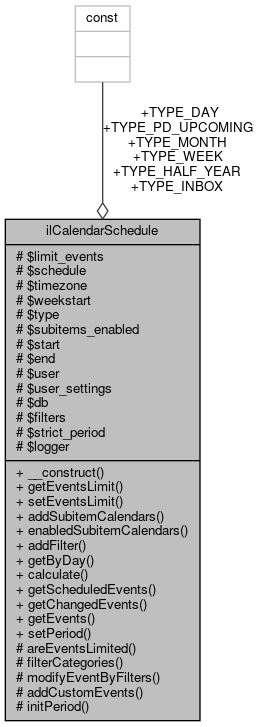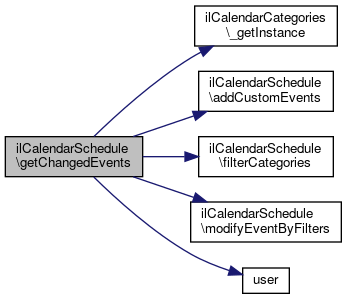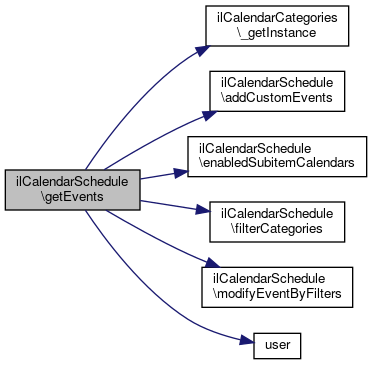Represents a list of calendar appointments (including recurring events) for a specific user in a given time range. More...
 Collaboration diagram for ilCalendarSchedule:
Collaboration diagram for ilCalendarSchedule:Public Member Functions | |
| __construct (ilDate $seed, $a_type, $a_user_id=0, $a_strict_period=false) | |
| Constructor. More... | |
| getEventsLimit () | |
| get current limit of events More... | |
| setEventsLimit ($a_limit) | |
| Set events limit. More... | |
| addSubitemCalendars ($a_status) | |
| Enable subitem calendars (session calendars for courses) More... | |
| enabledSubitemCalendars () | |
| Are subitem calendars enabled. More... | |
| addFilter (ilCalendarScheduleFilter $a_filter) | |
| Add filter. More... | |
| getByDay (ilDate $a_start, $a_timezone) | |
| get byday More... | |
| calculate () | |
| calculate More... | |
| getScheduledEvents () | |
| getChangedEvents ($a_include_subitem_calendars=false) | |
| get new/changed events More... | |
| getEvents () | |
| Read events (will be moved to another class, since only active and/or visible calendars are shown) More... | |
| setPeriod (ilDate $a_start, ilDate $a_end) | |
| Set period. More... | |
Data Fields | |
| const | TYPE_DAY = 1 |
| const | TYPE_WEEK = 2 |
| const | TYPE_MONTH = 3 |
| const | TYPE_INBOX = 4 |
| const | TYPE_HALF_YEAR = 6 |
| const | TYPE_PD_UPCOMING = 5 |
Protected Member Functions | |
| areEventsLimited () | |
| Check if events are limited. More... | |
| filterCategories (array $a_cats) | |
| modifyEventByFilters (ilCalendarEntry $event) | |
| addCustomEvents (ilDate $start, ilDate $end, array $categories) | |
| initPeriod (ilDate $seed) | |
| init period of events More... | |
Protected Attributes | |
| $limit_events = -1 | |
| $schedule = array() | |
| $timezone | |
| $weekstart | |
| $type = 0 | |
| $subitems_enabled = false | |
| $start = null | |
| $end = null | |
| $user = null | |
| $user_settings = null | |
| $db = null | |
| $filters = array() | |
| $strict_period | |
| $logger | |
Detailed Description
Represents a list of calendar appointments (including recurring events) for a specific user in a given time range.
- Version
- $Id$
Definition at line 36 of file class.ilCalendarSchedule.php.
Constructor & Destructor Documentation
◆ __construct()
| ilCalendarSchedule::__construct | ( | ilDate | $seed, |
| $a_type, | |||
$a_user_id = 0, |
|||
$a_strict_period = false |
|||
| ) |
Constructor.
@access public
- Parameters
-
ilDate seed date int type of schedule (TYPE_DAY,TYPE_WEEK or TYPE_MONTH) int user_id bool strict_period true if no extra days needed.
Definition at line 82 of file class.ilCalendarSchedule.php.
References $a_type, $DIC, $ilDB, $ilUser, ilCalendarCategories\_getInstance(), ilCalendarUserSettings\_getInstanceByUserId(), addFilter(), initPeriod(), ilCalendarCategories\MODE_CONSULTATION, ilCalendarCategories\MODE_PERSONAL_DESKTOP_MEMBERSHIP, ilCalendarCategories\MODE_PORTFOLIO_CONSULTATION, and user().
 Here is the call graph for this function:
Here is the call graph for this function:Member Function Documentation
◆ addCustomEvents()
Definition at line 382 of file class.ilCalendarSchedule.php.
Referenced by getChangedEvents(), and getEvents().
 Here is the caller graph for this function:
Here is the caller graph for this function:◆ addFilter()
| ilCalendarSchedule::addFilter | ( | ilCalendarScheduleFilter | $a_filter | ) |
Add filter.
- Parameters
-
ilCalendarScheduleFilter $a_filter
Definition at line 186 of file class.ilCalendarSchedule.php.
Referenced by __construct().
 Here is the caller graph for this function:
Here is the caller graph for this function:◆ addSubitemCalendars()
| ilCalendarSchedule::addSubitemCalendars | ( | $a_status | ) |
Enable subitem calendars (session calendars for courses)
- Parameters
-
return
Definition at line 167 of file class.ilCalendarSchedule.php.
◆ areEventsLimited()
|
protected |
Check if events are limited.
- Returns
- type
Definition at line 139 of file class.ilCalendarSchedule.php.
Referenced by calculate().
 Here is the caller graph for this function:
Here is the caller graph for this function:◆ calculate()
| ilCalendarSchedule::calculate | ( | ) |
calculate
@access protected
Definition at line 248 of file class.ilCalendarSchedule.php.
References $events, ilCalendarCategoryAssignments\_getAppointmentCalendars(), ilCalendarRecurrences\_getRecurrences(), areEventsLimited(), getEvents(), getEventsLimit(), IL_CAL_FKT_GETDATE, IL_CAL_UNIX, ilUtil\sortArray(), TYPE_DAY, and TYPE_WEEK.
 Here is the call graph for this function:
Here is the call graph for this function:◆ enabledSubitemCalendars()
| ilCalendarSchedule::enabledSubitemCalendars | ( | ) |
Are subitem calendars enabled.
- Returns
Definition at line 176 of file class.ilCalendarSchedule.php.
References $subitems_enabled.
Referenced by getEvents().
 Here is the caller graph for this function:
Here is the caller graph for this function:◆ filterCategories()
|
protected |
Definition at line 354 of file class.ilCalendarSchedule.php.
Referenced by getChangedEvents(), and getEvents().
 Here is the caller graph for this function:
Here is the caller graph for this function:◆ getByDay()
| ilCalendarSchedule::getByDay | ( | ilDate | $a_start, |
| $a_timezone | |||
| ) |
get byday
@access public
- Parameters
-
ilDate start
Definition at line 198 of file class.ilCalendarSchedule.php.
References $schedule, $start, ilDateTime\DAY, ilDate\get(), IL_CAL_DATETIME, and IL_CAL_UNIX.
 Here is the call graph for this function:
Here is the call graph for this function:◆ getChangedEvents()
| ilCalendarSchedule::getChangedEvents | ( | $a_include_subitem_calendars = false | ) |
get new/changed events
- Parameters
-
bool $a_include_subitem_calendars E.g include session calendars of courses.
- Returns
- object $events[] Array of changed events @access protected
Definition at line 402 of file class.ilCalendarSchedule.php.
References $DIC, $events, $ilDB, $query, $res, $row, $start, ilCalendarCategories\_getInstance(), addCustomEvents(), ilDBConstants\FETCHMODE_OBJECT, filterCategories(), IL_CAL_DATE, IL_CAL_DATETIME, IL_CAL_MONTH, modifyEventByFilters(), and user().
 Here is the call graph for this function:
Here is the call graph for this function:◆ getEvents()
| ilCalendarSchedule::getEvents | ( | ) |
Read events (will be moved to another class, since only active and/or visible calendars are shown)
@access protected
Definition at line 447 of file class.ilCalendarSchedule.php.
References $DIC, $events, $ilDB, $query, $res, $row, ilCalendarCategories\_getInstance(), addCustomEvents(), enabledSubitemCalendars(), ilDBConstants\FETCHMODE_OBJECT, filterCategories(), IL_CAL_DATETIME, IL_CAL_UNIX, modifyEventByFilters(), and user().
Referenced by calculate().
 Here is the call graph for this function:
Here is the call graph for this function: Here is the caller graph for this function:
Here is the caller graph for this function:◆ getEventsLimit()
| ilCalendarSchedule::getEventsLimit | ( | ) |
get current limit of events
- Returns
- type
Definition at line 148 of file class.ilCalendarSchedule.php.
References $limit_events.
Referenced by calculate().
 Here is the caller graph for this function:
Here is the caller graph for this function:◆ getScheduledEvents()
| ilCalendarSchedule::getScheduledEvents | ( | ) |
Definition at line 349 of file class.ilCalendarSchedule.php.
References $schedule.
◆ initPeriod()
|
protected |
init period of events
@access protected
- Parameters
-
ilDate seed
- Returns
Definition at line 505 of file class.ilCalendarSchedule.php.
References $start, ilCalendarUtil\_getMaxDayOfMonth(), IL_CAL_DATE, IL_CAL_DAY, IL_CAL_FKT_DATE, IL_CAL_FKT_GETDATE, IL_CAL_MONTH, IL_CAL_SECOND, IL_CAL_WEEK, ilDateTime\increment(), TYPE_DAY, TYPE_HALF_YEAR, TYPE_INBOX, TYPE_MONTH, TYPE_PD_UPCOMING, TYPE_WEEK, ilCalendarSettings\WEEK_START_MONDAY, and ilCalendarSettings\WEEK_START_SUNDAY.
Referenced by __construct().
 Here is the call graph for this function:
Here is the call graph for this function: Here is the caller graph for this function:
Here is the caller graph for this function:◆ modifyEventByFilters()
|
protected |
Definition at line 369 of file class.ilCalendarSchedule.php.
References $res.
Referenced by getChangedEvents(), and getEvents().
 Here is the caller graph for this function:
Here is the caller graph for this function:◆ setEventsLimit()
| ilCalendarSchedule::setEventsLimit | ( | $a_limit | ) |
Set events limit.
- Parameters
-
type $a_limit
Definition at line 157 of file class.ilCalendarSchedule.php.
◆ setPeriod()
Set period.
- Returns
Definition at line 616 of file class.ilCalendarSchedule.php.
Field Documentation
◆ $db
|
protected |
Definition at line 59 of file class.ilCalendarSchedule.php.
◆ $end
|
protected |
Definition at line 56 of file class.ilCalendarSchedule.php.
Referenced by addCustomEvents().
◆ $filters
|
protected |
Definition at line 60 of file class.ilCalendarSchedule.php.
◆ $limit_events
|
protected |
Definition at line 47 of file class.ilCalendarSchedule.php.
Referenced by getEventsLimit().
◆ $logger
|
protected |
Definition at line 70 of file class.ilCalendarSchedule.php.
◆ $schedule
|
protected |
Definition at line 48 of file class.ilCalendarSchedule.php.
Referenced by getByDay(), and getScheduledEvents().
◆ $start
|
protected |
Definition at line 55 of file class.ilCalendarSchedule.php.
Referenced by addCustomEvents(), getByDay(), getChangedEvents(), and initPeriod().
◆ $strict_period
|
protected |
Definition at line 65 of file class.ilCalendarSchedule.php.
◆ $subitems_enabled
|
protected |
Definition at line 53 of file class.ilCalendarSchedule.php.
Referenced by enabledSubitemCalendars().
◆ $timezone
|
protected |
Definition at line 49 of file class.ilCalendarSchedule.php.
◆ $type
|
protected |
Definition at line 51 of file class.ilCalendarSchedule.php.
◆ $user
|
protected |
Definition at line 57 of file class.ilCalendarSchedule.php.
◆ $user_settings
|
protected |
Definition at line 58 of file class.ilCalendarSchedule.php.
◆ $weekstart
|
protected |
Definition at line 50 of file class.ilCalendarSchedule.php.
◆ TYPE_DAY
| const ilCalendarSchedule::TYPE_DAY = 1 |
Definition at line 38 of file class.ilCalendarSchedule.php.
Referenced by calculate(), ilCalendarViewGUI\getEvents(), and initPeriod().
◆ TYPE_HALF_YEAR
| const ilCalendarSchedule::TYPE_HALF_YEAR = 6 |
Definition at line 42 of file class.ilCalendarSchedule.php.
Referenced by ilCalendarViewGUI\getEvents(), and initPeriod().
◆ TYPE_INBOX
| const ilCalendarSchedule::TYPE_INBOX = 4 |
Definition at line 41 of file class.ilCalendarSchedule.php.
Referenced by ilCalendarBlockGUI\getOverview(), and initPeriod().
◆ TYPE_MONTH
| const ilCalendarSchedule::TYPE_MONTH = 3 |
Definition at line 40 of file class.ilCalendarSchedule.php.
Referenced by ilCalendarBlockGUI\addMiniMonth(), ilMiniCalendarGUI\addMiniMonth(), ilCalendarViewGUI\getEvents(), and initPeriod().
◆ TYPE_PD_UPCOMING
| const ilCalendarSchedule::TYPE_PD_UPCOMING = 5 |
Definition at line 45 of file class.ilCalendarSchedule.php.
Referenced by ilCalendarBlockGUI\getEvents(), and initPeriod().
◆ TYPE_WEEK
| const ilCalendarSchedule::TYPE_WEEK = 2 |
Definition at line 39 of file class.ilCalendarSchedule.php.
Referenced by calculate(), ilCalendarViewGUI\getEvents(), initPeriod(), and ilCalendarWeekGUI\show().
The documentation for this class was generated from the following file:
- Services/Calendar/classes/class.ilCalendarSchedule.php
















